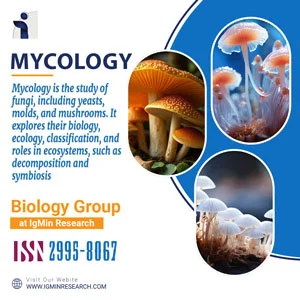About
**Discover Mycology: Advancing Fungi Research with IgMin Research**
Explore the expanding world of mycology and uncover groundbreaking research on fungi. IgMin Research provides a leading platform for:
• **Mycology journal submission:** Seamlessly submit manuscripts on diverse fungal studies for global recognition. [Quick Submission](https://www.igminresearch.com/quick-submission)
• **Mycology research publishing:** Benefit from a rigorous peer review and expert editorial support, ensuring high standards and visibility.
• **Submit manuscript on fungi:** Easily upload your latest discoveries and contribute to advancements in mycology. [Manuscript Guidelines](https://www.igminresearch.com/pages/manuscript-guidelines)
Additional advantages:
• Open-access publication for maximum reach
• Transparent, fast-track submission process
• Dedicated support for authors at every stage
Take your research further! Submit your work now via our main portal: [Submit Manuscript](https://www.igminresearch.com/submission)

Why publish with us?
Global Visibility – Indexed in major databases
Fast Peer Review – Decision within 14–21 days
Open Access – Maximize readership and citation
Multidisciplinary Scope – Biology, Medicine and Engineering
Editorial Board Excellence – Global experts involved
University Library Indexing – Via OCLC
Permanent Archiving – CrossRef DOI
APC – Affordable APCs with discounts
Citation – High Citation Potential
Which articles are now trending?
Research Articles
- Comparing Forecasting Models for Predicting Infant Mortality: VECM vs. VAR and BVAR Specifications
- A New Modification of Classification of Traumatic Patients with Pelvic Fracture
- On how Doping with Atoms of Gadolinium and Scandium affects the Surface Structure of Silicon
- Kinetic Study of the Removal of Reafix Yellow B8G Dye by Boiler Ash
- Analysis of the State of Moisture Control to Ensure and Regulate the Quality of Grain and Grain Products
- Effect of Rainfall on Water Parameters in Recreational Lakes in Heidelberg, Germany
Advertisement







